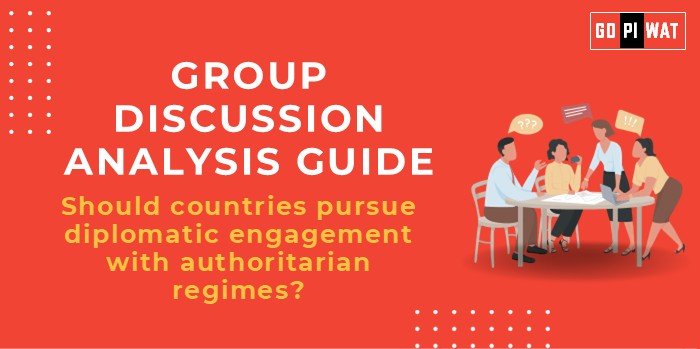📋 Group Discussion (GD) Analysis Guide
🌍 Should Countries Pursue Diplomatic Engagement with Authoritarian Regimes?
💡 Introduction to the Topic
🌱 Opening Context: Diplomatic engagement with authoritarian regimes is a contentious issue, balancing the need for dialogue against the risk of legitimizing autocratic practices. It holds global relevance, particularly in shaping foreign policy frameworks for economic stability, conflict resolution, and human rights advocacy.
📜 Topic Background: Diplomatic ties with authoritarian states have historical significance, such as U.S.-China relations post-1970s. Recent cases, like the U.S. engaging with North Korea or the EU’s dealings with Russia before its invasion of Ukraine, highlight the complex interplay of diplomacy, ethics, and strategic interests.
📊 Quick Facts and Key Statistics
- 📉 Authoritarian Governments: Account for 59 countries, covering 37% of the global population (Freedom House, 2024).
- 🌍 Trade Links: Authoritarian states like China contribute over 20% of global GDP.
- 🤝 Conflict Mediation: 60% of peace treaties involve at least one authoritarian regime (UN Report, 2023).
- ⚖️ Sanctions Effectiveness: Only 34% of sanctions on authoritarian regimes achieve intended political outcomes (Brookings, 2022).
🌍 Stakeholders and Their Roles
- 🏛️ Governments: Mediate through diplomacy or impose sanctions.
- 🏢 Businesses: Engage in trade, often facing ethical dilemmas.
- 🌐 International Organizations: Monitor human rights and mediate peace.
- 👥 Civil Society: Advocate for democracy and transparency.
🏆 Achievements and Challenges
🌟 Achievements:
- ✔️ Conflict Resolution: Talks with North Korea reduced nuclear test escalations (2018).
- 📈 Economic Gains: U.S.-China relations have boosted global trade by $5 trillion annually.
- 🌍 Public Welfare: Cuba’s healthcare collaborations with authoritarian states have reduced regional health crises.
⚠️ Challenges:
- ⚖️ Human Rights Concerns: Legitimizing regimes that suppress freedoms.
- 🔄 Backfiring Diplomacy: The EU’s Nord Stream dependence on Russia led to energy crises post-2022.
- 🌍 Global Comparisons: While the U.S.-China approach improved trade, Myanmar sanctions led to worsening human rights.
📜 Case Studies:
- 🇰🇵 North Korea: Negotiations in 2018 reduced nuclear tensions.
- 🇷🇺 EU-Russia Relations: Energy dependence on Nord Stream exposed vulnerabilities post-2022.
✨ Structured Arguments for Discussion
- 💬 Supporting Stance: “Diplomatic engagement ensures global stability by addressing conflicts and fostering trade, as seen with China-U.S. ties.”
- ⚖️ Opposing Stance: “Engagement risks legitimizing authoritarian regimes, compromising ethical foreign policy standards.”
- 🔄 Balanced Perspective: “Diplomatic ties are situationally beneficial but require strict accountability mechanisms to uphold ethical standards.”
🎯 Effective Discussion Approaches
📖 Opening Approaches:
- 📊 “37% of the global population lives under authoritarian regimes; ignoring them isolates millions.”
- 📜 “North Korea negotiations in 2018 exemplify diplomacy’s potential for de-escalation.”
🔄 Counter-Argument Handling:
- ✔️ “Engagement can inadvertently legitimize regimes, but stringent conditions can counterbalance this risk.”
- 💡 “Trade-offs are inevitable; diplomacy often prevents larger-scale conflicts.”
📈 Strategic Analysis (SWOT)
- 💪 Strengths: Promotes conflict resolution, fosters trade, builds dialogue.
- ⚠️ Weaknesses: Risks legitimizing authoritarian practices.
- 💡 Opportunities: Strengthen global governance and peace treaties.
- 🚨 Threats: Reputational damage, potential policy backfires.
📚 Connecting with B-School Applications
- 🌟 Real-World Applications: Projects on trade policy analysis with authoritarian states; humanitarian aid amid ethical dilemmas.
- 💬 Sample Interview Questions:
- “How should multinational companies balance ethics and profits in authoritarian markets?”
- “Analyze the role of diplomacy in balancing national interests with global governance.”
- 📖 Insights for B-School Students:
- Understand the intersection of ethics, diplomacy, and business strategy in authoritarian contexts.
- Explore case studies on how diplomacy shapes economic and political outcomes.


